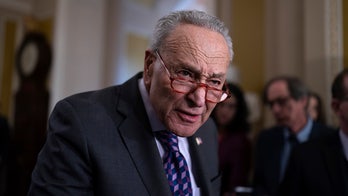
The Department of Homeland Security is doubling the number of law enforcement working along the Southwest border and could request border state governors to send National Guardsmen to help curtail spillover violence from Mexico.
DHS Secretary Janet Napolitano said Tuesday the goal of increased U.S. efforts along the border is twofold: to provide assistance to Mexico to break up the large cartels conducting what is essentially a drug war in Mexico and to guard against an increase in violence against the U.S. as a result of this war.
Mexico's drug violence has killed thousands in the past two years as gangs battle each other for territory and fight off a government crackdown.
The goal is to help the government of Mexico break up "huge cartels which are funneling tonnage quantities of illegal drugs into our country on a regular basis and are conducting this war of violence in Mexico that has resulted into 6,000 homicides, over 550 of which were assassinations on law enforcement and public office personnel," Napolitano said
The recent moves are part of a $700 million plan for securing the southern border with Mexico. The plan includes "redeploying" existing personnel from immigration enforcement, work site enforcement and possibly even customs enforcement to help prevent spillover violence.
President Obama is concerned about the increased level of violence, particularly in Ciudad Juarez and Tijuana, and the impact that it is having on the communities on both sides of the border, U.S. Deputy Attorney General David Ogden.
"He believes that the United States must continue to monitor the situation and guard against spillover into the United States. And the president is firmly committed to ensuring our borders are secure and we are doing all we can to reduce illegal flows in both direction across the border," Ogden said.
Working with the Department of Justice, DHS has announced eight components to fighting back against violence along the border, including doubling DHS presence in certain areas along the border and beefing up the violent crimes unit from 50 to 100 agents; tripling intelligence analysts along the border, likely centered in El Paso, Texas; and increasing Immigration and Customs Enforcement personnel at the attache office in Mexico from 24 to 36 officials.
DHS is also increasing its technology and south-bound rail screening to look for guns going from the U.S. to Mexico. DHS will also increase its outreach to state and local law enforcement and grant programs aimed at law enforcement.
Violence associated with drug cartels in Mexico has become the chief national security issue for Mexico. On Tuesday, the Mexican government announced it is offering $2 million each for information leading to the arrest of 24 top drug lords in a public challenge to the cartels' violent grip on the country.
The list indicated that drug gangs have splintered into six main cartels under pressure from the U.S. and Mexico. The two most powerful gangs, the Sinaloa and Gulf cartels, each suffered fractures that have given rise to new cartels, according to the attorney general.
The Justice Department is going to treat the Mexican cartels like they treated criminal organizations such as the Italian mob -- using certain laws to target them.
The FBI is also creating a Southwest Intelligence Group to serve as a clearinghouse of all FBI activities involving Mexico and is increasing its focus on public corruption, kidnappings, and extortion relating to border issues. It is also recommitting itself to the Central American Fingerprint Exchange initiative, which was developed to collect, store and integrate biometric data from El Salvador, Guatemala, Belize, Honduras, and the Mexican state of Chiapas as well as the Transnational Anti-Gang initiative, which coordinates the sharing of gang intelligence between the U.S. and El Salvador, where the gang MS-13 originated.
The Drug Enforcement Administration will add 16 new agents to its 11 offices along the southwest border region, and the Justice Department will create four new "mobile enforcement teams" in Chicago, Atlanta, Phoenix and El Paso.
The Bureau of Alcohol, Tobacco and Firearms is creating 37 new positions for "Project Gunrunner" to keep guns from going to Mexico. ATF has helped bring in 1,500 defendants on charges involving 12,000 weapons.
U.S. Marshals are going to Mexico to help authorities pick up and bring back cartel leaders to prosecute and the Justice Department is going to create a Southwest intelligence group located in El Paso to focus on public corruption and kidnapping.
Treasury has also made targeting the financial networks of Mexican drug trafficking organizations a top priority and is collaborating with the Mexican government to analyze cross-border cash flows to try to distinguish legitimate activity from drug money laundering and other illicit transactions.
FOX News' Mike Levine contribute to this report.




